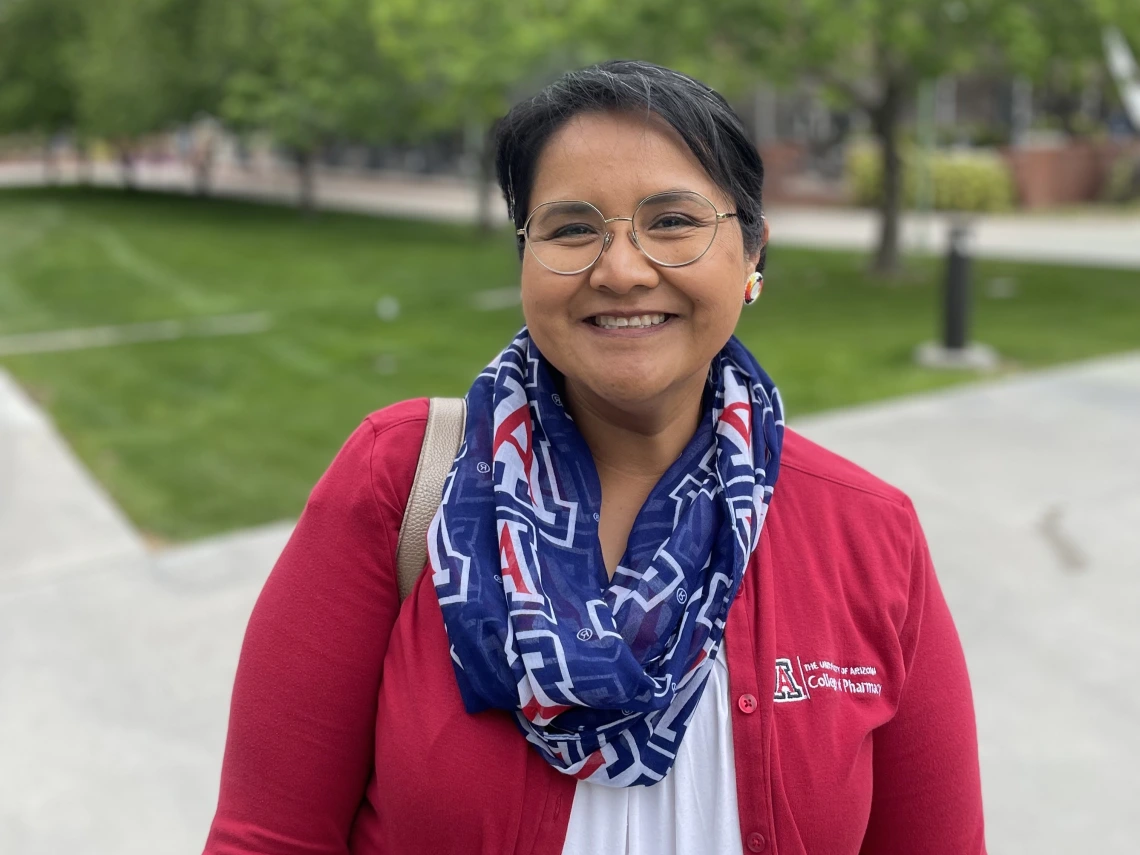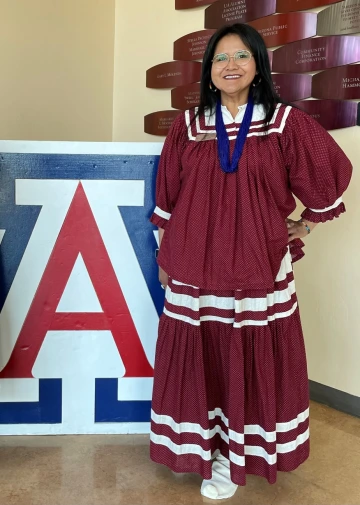Native American Heritage: Jennifer Martin

From building curriculum to assisting in research, or answering calls from P4 students on rotation, Martin’s dedication to her profession and the Coit College of Pharmacy is inspiring. It wasn’t the fact that her mother was a librarian or a love of reading that encouraged Martin to pursue librarianship, it was the desire to foster an environment of information of innovation and pursuit of knowledge through librarianship.
Martin, who has been with the university for 17 years, has served as an embedded librarian for the Coit College of Pharmacy since 2007. Her primary responsibility is to support the research and scholarship of faculty, students, and staff through consultations, collaborations, and library instruction. Martin works closely with faculty to integrate library instruction into courses in the PharmD program and the graduate and undergraduate curricula, all while leading expert biomedical literature searches.
Library and information science is an interdisciplinary field. While many are familiar with public librarians in community and academic libraries, there are diverse specialties within the field focused on archives, law, medicine and corporate. Martin’s background in chemistry and her degree in library science led her to the corporate world, where she established a library and supported research and development for Ventana Medical Systems. Although it wasn’t a linear path to her current appointment, it was her passion for research that ultimately led her to the university.
Martin joined the university in 2007 and obtained a dual appointment as a clinical instructor in the Department of Pharmacy Practice and Science in 2011. She has since developed a library instruction for first—through fourth-year students from basic research skills to advanced search methodologies. "It’s not just about doing it for them; it’s teaching them the tools and resources to do it themselves," Martin says.
In the P3 drug information course, Martin teaches students to manage citations, effectively use resources, and apply them in their final research papers. "It’s really about supporting them in their research, whether helping to develop their research question or finding resources for their project. Sometimes, collaboration comes out of that," she explains.
In her commitment to making information accessible, Martin created a collection in the UA Campus Repository and uploaded senior research projects dating back to 2015, providing students with access to past projects to help them shape their own projects. She ensures that the information is accessible to a global audience. “I get requests from across the country—and sometimes across the globe—asking for a copy of a paper. Once I get permission from the author, I’m happy to share it (with permission from the author),” she says. With the increase in information, Martin is there to help students narrow it down, understand their angle of approach to best accomplish their task. Moving away from physical libraries, these searches increasingly take place online.
As information overload becomes an increasing challenge, Martin helps students focus on their research and navigate the overwhelming amount of information available. “I like finding the right information and teaching others how to do it,” she says. Her expertise lies in creating effective searches and understanding how databases are structured, but she also emphasizes the importance of identifying misinformation. "Teaching students how to locate and verify authoritative information is crucial, especially in health sciences education, because these professionals will work directly with patients," she says.
Looking beyond traditional databases like PubMed, Martin sees the potential of emerging technologies, such as generative AI like ChatGPT. “I encourage people to embrace it, learn about it, understand its limitations, and see how it can be applied in academia,” she says.
As the digital landscape evolves, librarians are always going to be at the forefront. In an AI workgroup at the main campus library, what Martin is learning is phenomenal. She’s finding ways to save time for both her and her students. Believing that this is something everyone should know is available, she can see the significance of generative AI in education, not just for students but also for faculty. “I think it really has some positive implications for the future of education.”

While Martin’s work is at the cutting edge of information science, she is also the historian for the University of Arizona Native Faculty group. In this organization, they support Native American faculty, their contributions, promotion and tenure, and foster a climate of collaboration and inclusion. An important step in promoting diversity and inclusivity on campus, it additionally supports Native American students and their academic success.
Over the years, Martin has built lasting relationships across the college. These connections, many formed through collaborative research and support for faculty scholarship, reflect her commitment to the academic community.
Recently, Martin was recognized by the American Association of Colleges of Pharmacy (AACP) Drug Information and Library Science Section, receiving the 2023 Best Publication Award for her study on drug information resources for interactions between therapeutic drugs and drugs of abuse. Her other accolades include being the first librarian to receive the AACP New Investigator Award in 2010, serving as Chair of the Library and Information Sciences Section of AACP from 2019-2020, and contributing to initiatives supporting pharmacy education.
Whether she’s encouraging students, conducting research with faculty, advancing information literacy, or supporting the Native American community, Martin demonstrates a commitment to the UA Libraries Mission of “promoting inquiry, creative endeavor, scholarly communication and lifelong learning” for the college and beyond.

